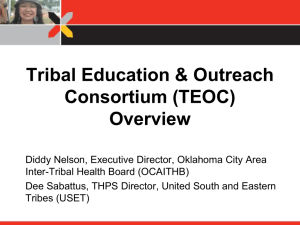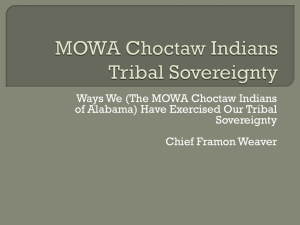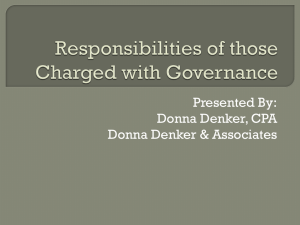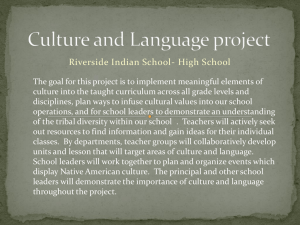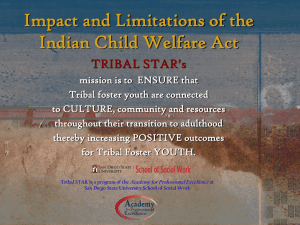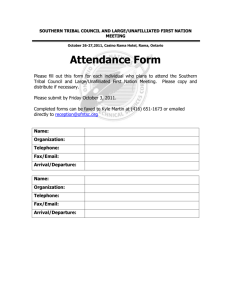Stakeholders Checklist and Engagement Strategies
advertisement
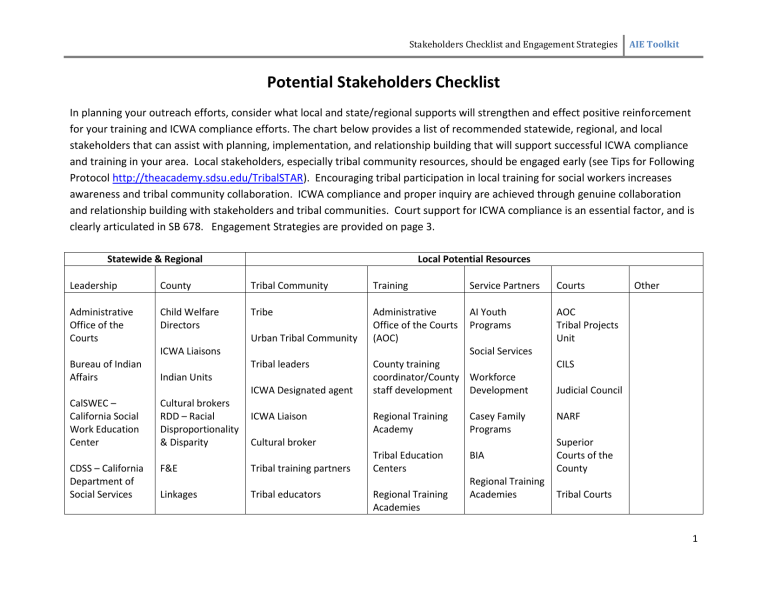
Stakeholders Checklist and Engagement Strategies AIE Toolkit Potential Stakeholders Checklist In planning your outreach efforts, consider what local and state/regional supports will strengthen and effect positive reinforcement for your training and ICWA compliance efforts. The chart below provides a list of recommended statewide, regional, and local stakeholders that can assist with planning, implementation, and relationship building that will support successful ICWA compliance and training in your area. Local stakeholders, especially tribal community resources, should be engaged early (see Tips for Following Protocol http://theacademy.sdsu.edu/TribalSTAR). Encouraging tribal participation in local training for social workers increases awareness and tribal community collaboration. ICWA compliance and proper inquiry are achieved through genuine collaboration and relationship building with stakeholders and tribal communities. Court support for ICWA compliance is an essential factor, and is clearly articulated in SB 678. Engagement Strategies are provided on page 3. Statewide & Regional Local Potential Resources Leadership County Tribal Community Training Service Partners Courts Administrative Office of the Courts Child Welfare Directors Tribe Administrative Office of the Courts (AOC) AI Youth Programs AOC Tribal Projects Unit Urban Tribal Community ICWA Liaisons Bureau of Indian Affairs Tribal leaders Indian Units CalSWEC – California Social Work Education Center Cultural brokers RDD – Racial Disproportionality & Disparity ICWA Designated agent CDSS – California Department of Social Services ICWA Liaison Social Services County training coordinator/County Workforce staff development Development Regional Training Academy Casey Family Programs Tribal Education Centers BIA Cultural broker F&E Tribal training partners Linkages Tribal educators Regional Training Academies Regional Training Academies Other CILS Judicial Council NARF Superior Courts of the County Tribal Courts 1 Stakeholders Checklist and Engagement Strategies CWDA – Child Welfare Directors Association Family Finding Tribal health services Coalitions Tribal youth services CFPIC – Child & Family Policy Institute of California Training Coordinators Tribal social services Casey Family Programs Regional Training Academies AIE Toolkit Tribal TANF Regional Training Academies Children & Families Coalitions Consortia Cultural Centers Tribes Urban vs Rural considerations: Counties with large urban areas and counties with no existing tribal reservation should identify those American Indian/Alaska Native service agencies (health centers, Tribal TANF, Title VII Indian Education) as potential stakeholders. In the absence of tribes, these agencies serve an important role in maintaining community and family connection to cultural resources. There may or may not be a forum or collaborative group that addresses the needs of Indian foster youth. If there is, your plans should include partnering with this group. In other areas where tribes are present, it is recommended to contact the tribal ICWA designated agent and seek support and identify the best way to engage the tribe and other tribal resources. These workers have experience and history with families, tribal leadership, and tribal resources and should be actively involved in planning and training of county social workers. 2 Stakeholders Checklist and Engagement Strategies AIE Toolkit Stakeholder Forum Sample Approaches, Agenda Items and Suggested Focus Discussion Statewide & Regional Stakeholder Leadership Provide fact sheets Data Recent applicable ACL’s County Provide fact sheets Data Recent applicable ACL’s Agenda Items: SIP & PQCR and Stakeholder engagement American Indian Enhancement Toolkit Agenda Items: SIP & PQCR and Stakeholder engagement American Indian Enhancement Toolkit How are monitoring and documenting our ICWA efforts? How are monitoring and documenting our ICWA efforts? What do we need to improve effective identification of Indian children? What do we need to improve effective identification of Indian children? Local Potential Stakeholders Tribal Community Phone Personal Visit Work through staff with known positive relationships with Tribe(s) and AI/AN service providers. Agenda Items: Understanding AI/AN services for children in CWS. Understanding eligibility for enrollment to tribe(s). Understanding needs of Indian children in care. How can we support families and children at risk? Training Contact regional Training Academy Contact local Tribal providers and ask who can train county staff about needs of Indian children. Convene planning meeting. Agenda Items: Overview of ICWA training requirements. Identify potential tribal co-trainers. Identify tribal youth and parent participants. How can we utilize training to improve county-tribal collaboration? Service Partners Contact local service partners and ask who can provide an overview of services at ICWA or related training? Courts Contact AOC Tribal Project Unit and identify local resources to support toolkit implementation. Agenda Items: Review current providers and develop resource list of resources for Indian children. Ask ICWA workers what are current challenges in courts? How can we improve collaboration? Seek support of presiding judge, county counsel, and district attorney (if appropriate). How can we better identify Indian children in our care? Have a plan to mediate courageous conversations. How can we reduce gaps in services? 3

